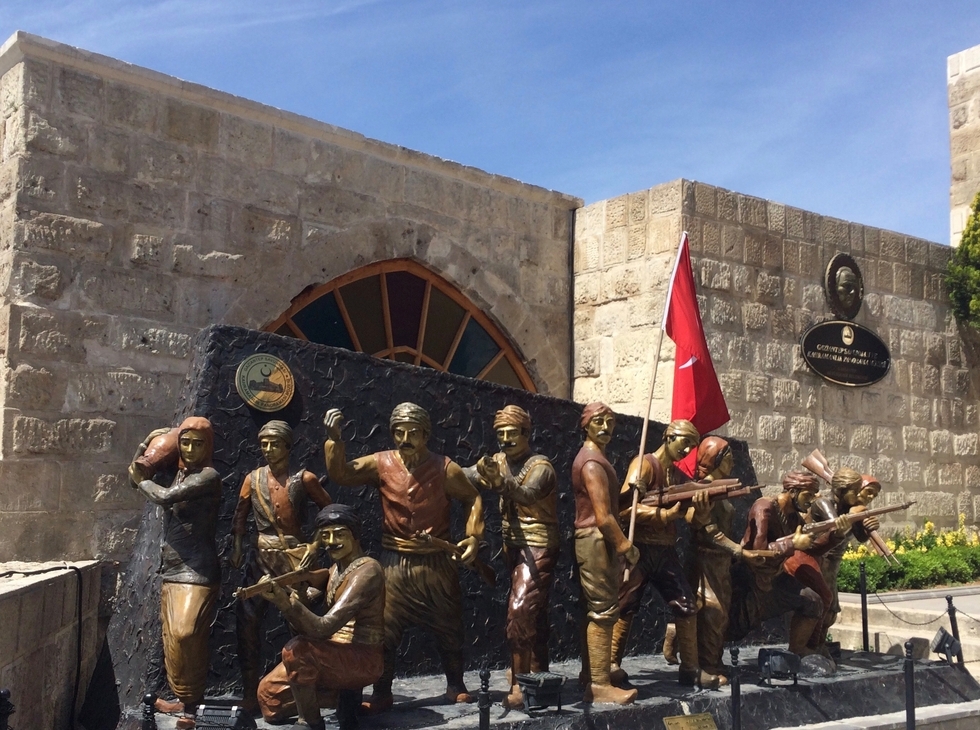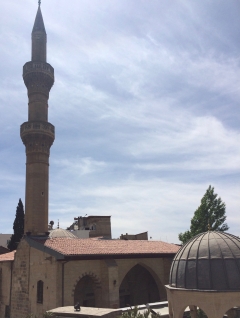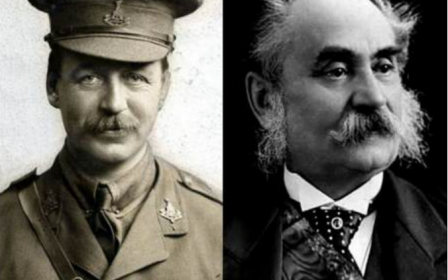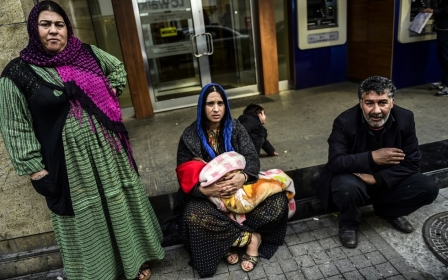Gaziantep: Murder, paranoia in Turkey’s economic powerhouse

GAZIANTEP, Turkey - On Gaziantep’s central parades, visitors are greeted by trees decorated with sparkling fairy lights and a string of cafes. A few streets away, the gleaming white Forum shopping centre supplies the city with Starbucks and Tommy Hilfiger. International hotel chains – from Hilton to Holiday Inn – greet foreign diplomats, journalists and aid workers.
With the smart city municipality signs stuck to every object from buses to fence posts, the old quarter restoration and signs of commerce everywhere, you would be forgiven for thinking Gaziantep is a city on the up.
Indeed it was. In the first decade of the 21st century, Gaziantep – now a city of around 1.8 million people – grew as a hub of trade, industry and education. That was undoubtedly helped by injections of money from at least seven EU projects, and the multi-billion dollar Southeastern Anatolia Project, which will receive a further $10bn by 2018.
The local Chamber of Commerce nevertheless insists that “local entrepreneurship” rather than “government investment” is the engine of Gaziantep’s success.
More than 80 percent of Turkey’s machine-made carpets, 70 percent of its lentils and bulgur wheat and a third of all chocolate wafers come from the city, according to the chamber. It also claims exports increased by 99 percent to $5.9bn between 2009 and 2013. A third of all trade was with Iraq.
The city sold itself to international investors as, “a gateway between the Middle East and the European Union”, with a “young, dynamic population” and the allure of nearby “emerging markets”.
But Gaziantep’s proximity to Syria and Iraq – Aleppo is just 100km away – these days may be more of a problem than a selling point.
Security threats are real
This week, a Syrian woman and her child were shot dead in their apartment in the city and police were hunting suspects and examining CCTV footage. The anti-Islamic State (IS) group, Raqqa is Being Slaughtered Silently (RBSS), dismissed reports that one of their team had been killed alongside them. Two RBSS activists were killed in the neighbouring Turkish city of Sanliurfa last autumn. The latest deaths were not linked to any group, but are expected to rattle nerves among the Syrian population.
Gaziantep's police force, however, has been targeted by IS. A fortnight ago, a car bomb detonated next to police headquarters in an attack that security sources said was carried out by IS. It left two police officers dead and almost 30 wounded.
Cells loyal to IS are known to operate in Gaziantep and suspects have blown themselves up with explosives in police raids on apartments that were believed to be operating rooms.
A man who blew himself up with a suicide belt in a police raid on an IS cell in Gaziantep was known as the "prince" of the militant group's local ring. Turkish national Yunus Durmaz killed himself as officers prepared to close down his hideout in a counter-terrorism operation.
In 2014, police seized 33 suicide vests along with 250kg of explosives in raids in the province, as well as grenades and Kalashnikovs. The vest used in a lethal attack on Suruc last July was later linked to the Gaziantep trove, police sources told CNN Turk.
Prominent activists have been killed in broad daylight in attacks claimed by IS. In December, renowned Syrian opposition journalist Naji Jerf was shot dead in the city centre, a day before he was due to leave for France, where he had been granted asylum. Jerf had made anti-IS films that made him a target for the group’s sympathisers in Turkey.
Then, last month, Mohammed Zahir al-Sherqat, an opposition television presenter, died from shotgun wounds after he was attacked near a restaurant popular with Syrians.
The attacks have been accompanied by reports of sermons in IS-controlled towns in northern Syria, encouraging violence in Gaziantep. Friday prayers in Bab, Manbij and Jarablous have been used to announce that the southeastern province is among its “primary targets,” according to Turkish newspaper Yeni Safak.
Visitors to the city are now advised to keep a low profile and not to dismiss rumours of terrorist sympathisers tracking Westerners’ movements. As recently as 2013, Leigh Turner, British Foreign Office director-general for trade & investment for Turkey, wrote that Gaziantep was key to “driving the integration process” for the EU and Turkey.
Now, the office advises against all but essential travel to the city, citing militant plans to carry out further attacks, which remain “likely”.
Syrians who fled to the city say they are increasingly nervous. They number 50,000 in camps in Gaziantep province – but nearly 300,000 more live in the city and surrounding area, according to the latest Turkish government figures.
Mohamad Taha, 22, originally from Deir Ezzor, said Syrians are forced to take security precautions – particularly since the deaths of Naji Jerf and Mohammed Zahir al-Sherqat.
“There is no security for Syrian activists,” he said. “Many are moving houses on an ongoing basis and do not linger in public places frequently. Sundays are a ‘black day’ for them and they avoid going out at all unless it’s essential.”
One Syrian civil society organisation registered as an NGO in Turkey put it more bluntly.
“We will not stay in Gaziantep because of security issues,” a spokesperson said, asking to remain anonymous for the sake of safety. “It will get worse and worse here, tensions with the Turks, because there are hundreds of thousands of Syrians here. Syrians have already been beaten in the street and this will happen more.”
One Syrian journalist in the city was last month the victim of an unsuccessful knife attack in central Gaziantep. He told MEE that he now limits his movements and avoids public places.
Syrians feel growing resentment
Tensions have risen between some members of the Turkish community and the increasing Syrian population. The newcomers struggle with lack of job opportunities, pay inflated accommodation costs and are victims of occasional violence from locals who feel threatened by their presence.
In 2014, rumours spread among local Turks that Syrians had poisoned the tap water – claims later denounced by both the city’s mayor and water-and-sewage authorities. But the accompanying protests, staged to cries of “We do not want the Syrians,” were evidence of local sentiments.
“There are too many people here now,” said one Turkish staff member at Gaziantep’s tourist office. “It is cheap for them here – at least cheaper than Europe. They can rent for $135 a month. They lost a lot of money and of course there are some with difficulties. But we have the same culture and we let them work. We understand them. Turkey is better than Europe for them.”
Those claims were countered by Syrians interviewed in Gaziantep, who said they faced increasing resentment from the Turkish population and were subject to systematic financial discrimination.
Three separate sources said landlords charged Syrians $235 a month for accommodations that would be offered to Turks for $100-$135.
“Living costs are high in Gaziantep,” said Mohamad Taha. “In terms of rent, it is the most expensive city near the border. The presence of Syrian organisations and third parties that deal with Syrians may have contributed to the price hikes.”
Syrians have stayed in Gaziantep, rather than move elsewhere in Turkey, partly through constraint. Refugee camps and aid programmes are concentrated in the east, away from Turkey’s precious west-coast tourism industry. They have also stayed because of some cultural familiarity. The echoes of Syria’s largest city in Gaziantep’s mosques and marketplaces are not surprising, given many were built by the governor of Aleppo during Ottoman times, before the border was drawn between modern-day Turkey and Syria.
Visitors are staying away
The Turkish tourist board still distributes shiny pamphlets touting its “rich history, culture, and popular museums”. It also boasts of investment in tourism infrastructure, but the proximity to war means international tourists are staying away.
“It is supposed to [be] high season, but we have many fewer tourists,” said a staff member at the Asude Konak, a beautifully restored house from 1893 that now serves as a boutique hotel. “The advice of foreign offices in Europe and America, advising people not to come, has made things hard for us.”
Zincirli Bedesten, Huseyin Pasha Bedesten and Kemikli Bedesten – the city’s most famous covered markets – buzz with people. But purchases appear to be confined to the basics. The piles of lavishly sugared loukums – Turkish delight – and the region’s “Yemeni” style sandals seemed untouched.
Still, amid the complex problems, the city’s economy remains healthy
Even with heavier demands on public services – rubbish collection, water and electricity use – and blows to the tourism sector, Gaziantep’s economy has not declined as a result of the Syrian influx.
Syrians from Aleppo have taken to Gaziantep’s bazaars and pale stone streets as merchants and restaurateurs, and have set up factories producing textiles, shoes and carpets.
A report last year from the Ankara-based Center for Middle Eastern Strategic Studies found that Syrians, with their excellent business contacts across the wider region, had boosted the economy by exporting Turkish goods to new markets. The same report found no evidence that Syrians were taking positions that Turks would otherwise fill. “Syrians are generally employed in areas that locals are not willing to work in,” it said.
Tammam al-Baroudi, director of the Syrian Economic Forum in Gaziantep, said the local economy had improved greatly since Syrians had moved in – although he could not provide figures
“Gaziantep was a quiet city before the revolution in Syria; now it is much more active. There has been a lot of change in three years, international and Syrian organisations work here, and their employees spend their money, drive their cars and live here. Syrian businesses operate and pay taxes,” he said.
The number of Syrian-owned businesses registered in Gaziantep rose from three in 2010 to more than 600 last year, with many in footwear, textiles and household goods. Smaller shops supply Syrian food and coffee – often superior to the Turkish variety – and mobile phone gear.
There are thought to be another 1,300 unregistered – non-tax-paying – Syrian businesses. And although inflation is high – year on year price rises early in 2016 were nearly 11 per cent in Gaziantep - Baroudi insists Syrian enterprise has not caused tensions with the Turkish population.
“We feel happy with the Turkish people and most of us feel relaxed in Gaziantep. Turkish shops in Gaziantep now write on their frontages in Arabic, and say they employ Arabic-speaking staff,” he said. “Now they are eating our bread and some of us are eating theirs. There is an exchange.”
The Gaziantep Chamber of Commerce did not respond to repeated requests for information on the city’s economy.
Local government vows to protect civilians
Despite the threats from IS, local authorities say Gaziantep will be safe. After the car bomb attack on 1 May, politicians took to their social media channels to insist security forces and civilians would be protected.
Gaziantep Provincial President Mehmet Eyup Ozkeçeci of the ruling AK Party, said: "Our country will overcome terrorism.”
Gaziantep's AKP Mayor, Fatma Sahin, said: "With patriotism, our city Gaziantep will overcome these difficult times."
Local council officials did not respond to requests for specific comments on the security situation in the city.
Gaziantep beguiles and confuses. On one hand, visitors can wander its pale stone streets, drink in the smell of syrupy baklava and marvel at its restored old city.
At the same time, it is difficult to forget the words of the Syrian civil society organisation spokesperson who plans to leave: “The Turkish will let people beat Syrians in the street. Next year, we won't be in Gaziantep."
New MEE newsletter: Jerusalem Dispatch
Sign up to get the latest insights and analysis on Israel-Palestine, alongside Turkey Unpacked and other MEE newsletters
Middle East Eye delivers independent and unrivalled coverage and analysis of the Middle East, North Africa and beyond. To learn more about republishing this content and the associated fees, please fill out this form. More about MEE can be found here.





